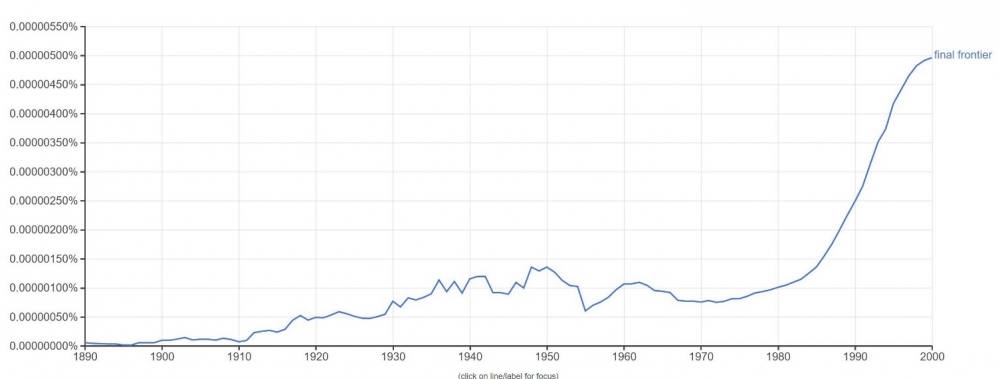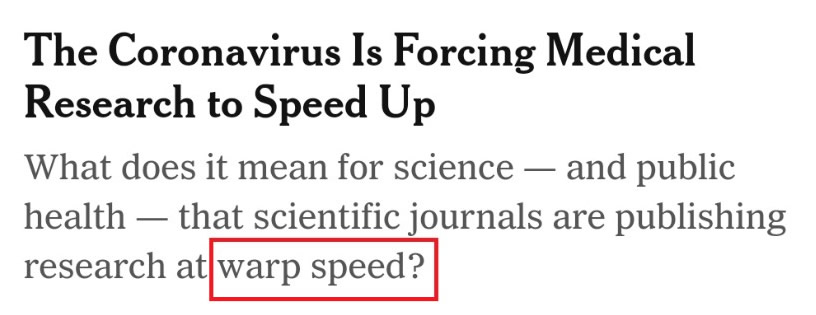|
 One evening in 2018, I wrapped up my homework for a
vocabulary-focused MA course and fired up Netflix for a little comfort food in
the form of Star Trek. As I listened to the famous
opening monologue (“Space: the final frontier”), I suddenly wondered:
Was this TV show responsible for introducing the phrase “final frontier” into
American English?
One evening in 2018, I wrapped up my homework for a
vocabulary-focused MA course and fired up Netflix for a little comfort food in
the form of Star Trek. As I listened to the famous
opening monologue (“Space: the final frontier”), I suddenly wondered:
Was this TV show responsible for introducing the phrase “final frontier” into
American English?
Culture: The Final
Frontier
Corpus
research demonstrated that the 1966 version of Star Trek
was, in fact, one of the earliest documented instances of that collocation.
Judging by Google Books, its usage has soared since Star Trek premiered: the phrase “final frontier” became 500% more popular
between 1960 and 2000 (Figure 1). Intriguingly, all pre-1960s instances of
“final frontier” that I found used frontier in the sense
of border. However, 21st-century matching strings for
“final frontier” almost exclusively refer to outer space. In short, Star Trek’s definition for “final frontier” has replaced
all other potential meanings.

Figure 1.
Google Books Ngram Viewer,
“final
frontier,” 1890–2000.
Digging
deeper, I noticed that the pattern of “NOUN, the final frontier” could be found
in unexpected places: financial headlines, websites unrelated to Star
Trek, and even academic journals (see Figure 2).

Figure 2. Headline from a financial blog. (Pocard,
2016)
“Final
frontier” wasn’t alone, either: phrases such as “warp speed” and “beam up”
appear everywhere from pot roast recipes to serious news articles (see Figure
3).

Figure 3. Home
page of NYTimes.com, 25 April 2020. (Tingley, 2020)
Would an
English language learner understand those texts, if they were unfamiliar with Star Trek? Probably not without support.
When Words and
Collocations Become Idioms
Though Star Trek was where I began my research, there are dozens
of works of fiction that have introduced new words and collocations to the
English language. Consider the following list of terms coined within the past
50 years:
|
Term |
Origin |
|
Bucket list
(n) |
Movie,
Bucket List (2008) |
|
Red pill
(v) |
Movie, The Matrix (1999) |
|
Macgyver
(v) |
TV show, MacGyver (1985-1994) |
|
Stan
(v) |
Song, “Stan”
(2000) |
|
Go darkside /
join the dark side (v) |
Movie series, Star Wars (1977-2019) |
Looking
further back in history, you can find an even greater variety of such phrases,
including:
|
Term |
Origin |
|
Chase a white
whale |
Book, Moby Dick (1851) |
|
Albatross around
my neck |
Poem, “The Rime
of the Ancient Mariner” (1798) |
|
Down the rabbit
hole |
Book, Alice in Wonderland (1865) |
|
We’re not in
Kansas anymore |
Movie, Wizard of Oz (1939) |
In every
case, the influence of these phrases goes well beyond the original context for
which they were coined. In short, these phrases have become idioms. English
users who aren’t familiar with them are likely to get lost in certain discourse
spaces, especially online. Sooner or later, every student of English will
encounter one of these—and when they do, neither textbooks nor dictionaries
will help them understand.
So, how can
teachers introduce these to our students?
Suggested Classroom
Activities
1. Watch Clips
Together
Use of authentic media,
including films and TV shows, is already popular as a listening exercise.
Albiladi et al. (2018) have also shown that learners perceive American movies
as a valuable source of both cultural knowledge and new vocabulary. The caveat
is, of course, that movies aren’t designed for pedagogical purposes, so
teachers must support learners’ understanding of them.
 With a bit
of preparation, even a clip that uses advanced vocabulary can be a fun addition
to a course. I like to start the semester by asking students whether they
already enjoy English-language media, and if so, what types? In the process,
I’ve discovered secret fans of everything from Fight Club to Dallas. After getting a sense of the crowd’s
preferences, I can find appropriate clips that they will appreciate. With a bit
of preparation, even a clip that uses advanced vocabulary can be a fun addition
to a course. I like to start the semester by asking students whether they
already enjoy English-language media, and if so, what types? In the process,
I’ve discovered secret fans of everything from Fight Club to Dallas. After getting a sense of the crowd’s
preferences, I can find appropriate clips that they will appreciate.
For example,
one group expressed interest in knowing “what movies all Americans would know.”
Realizing that six lines on the American Film Institute’s 100
Years…100 Quotes list come from Casablanca, I decided to teach the film’s final 6 minutes.
The worksheet I created (Appendix) activated students’ schema about World War
II. Then, the group watched the scene and worked together to figure out the
meanings of lines like “we’ll always have Paris,” “round up the usual
suspects,” and “this could be the beginning of a beautiful friendship.” We
finished the class by imagining conversational situations in which one of these
lines might come up. The funniest part was the following week, when some
students were late returning from break, and another student said, “I’ll round
up the usual suspects!”
A similar
lesson, or series of lessons, could be used to introduce the meaning of many
idioms on our list, such as “we’re not in Kansas anymore” or
“macgyver.”
2. Critically
Examine a Phrase’s Origins
Sometimes, the current
meaning of a phrase is quite far removed from the context in which it was
coined. In this case, awareness of the concept underlying the metaphor is more
important than knowing the source.
“The red
pill,” for example, entered the language as a reference to The
Matrix (1999), in which a man living inside a simulation breaks out
into the real world. The phrase “red pill” came to mean “opening your eyes to a
fact you’ve been ignoring.” In May 2020, however, Elon Musk tweeted “Take the
red pill” and got cursed at by the screenwriter of The
Matrix.

Figure 4: Lilly Wachowski replies to Ivanka Trump
and Elon Musk, 17 May 2020 (Pulver, 2020). NOTE: This image has been modified to censor possibly offensive language.
Even people
who have seen The Matrix might not be able to guess why
quoting the movie infuriated its screenwriter. Online, as it turns out, the
phrase “red pill” has been coopted by several movements with whom Ms. Wachowski
disagrees. The Men’s Rights Movement, for instance, uses it to mean “realizing
that feminists are secretly oppressing men.” Among alt-righters, it can refer
more generally to opposing government action. In Mr. Musk’s case, he was
apparently suggesting that Americans should defy public health orders and
reopen businesses during the COVID-19 pandemic (Pulver, 2020).
Learners who
practice their English online may encounter these darker meanings of “red pill”
long before they learn its more innocuous meaning. A teacher can help by
introducing the phrase’s origins and its evolution at the same time. For
example:
-
Watching the original
scene
-
Predicting
what “take the red pill” means based on its origin
-
Checking predictions
against the four different definitions provided by UrbanDictionary.com
(assuming, of course, that your audience is comfortable with user-provided definitions
which may use harsh language)
-
Discussing how the first
meaning led to the others
-
Reading articles about
online communities who call themselves “Red Pillers” and debating their
significance
This type of
discussion could be used for many other phrases that mean something different
online than off. For instance, depending on the context, “down a rabbit hole”
can mean discovering something unexpected, becoming obsessed with a new hobby,
or being swallowed up by a conspiracy theory. The relationships among those
definitions could spark a fascinating classroom conversation with advanced
students.
3. Work With Text
Types
Finally, one can combine a
cultural vocabulary lesson with a lesson on text types. Byrne & Jones
(2018) have pointed out that the verbal captain’s logs delivered throughout
each Star Trek episode are “more than an expository
device…[they] require the Captain to conduct self-analysis.” In other words,
Captain Kirk demonstrates reflective self-talk. As many learning journals and
assignment reflections prove, some students struggle to get started with that
process.
In my
intensive English program, every student must assemble a semester portfolio of
eight to 12 assignments and write reflections for each one. In the past,
students have asked why they can’t simply post their assignment and their
grade. So, I decided to explicitly teach the reflection format, usingStar Trek. This spring, I developed a lesson plan based
around clips from theepisodes “The
Man Trap” and “Arena.”
(Both episodes are available through subscription on Netflix and CBS All
Access.) The sequence was as follows.
-
Elicit meaning of the words
“blog” and “log in.” Ask students to predict what “log” originally meant. Guide
them to “a record of everything that happens.”
-
Introduce the basic format
of a log: date, what happened, why it happened, what’s next.
-
Activate knowledge about
sci-fi. Point out that the genre uses some made-up words (e.g., technobabble).
-
Preteach the technobabble for Clip 1.
-
Have students watch Clip 1
and answer: What happened? Why? What’s next? (Repeat as necessary.)
-
Between clips, discuss why
a log is an important TV narrative device: It helps the audience catch up if
they missed a scene. Connect this with how they can explain their work to an
outside grader.
After five
clips, we progressed to writing a captain’s log about something we each did
that day. In a follow-up lesson, we translated our three questions into
questions you can ask about any project:
-
What
happened ⇨ What went well? What didn’t go well?
-
Why
⇨ What skills did I use? Which ones need more practice?
-
What’s
next ⇨ How can I do better on the next assignment?
Finally, we
used this format as a guideline for writing assignment reflections for their
end-of-semester portfolios. I noted that, despite the midsemester switch to an
online format, there were fewer questions about how to write a reflection or
why reflections are useful.
Conclusion
Because
English-language media have contributed idioms to the English language, English
learners need to be exposed to influential media artifacts. Using movies and TV
to teach vocabulary is an enriching and fun addition to a standard English
language curriculum.
References
Albiladi, W.
S., Abdeen, F. H., & Lincoln, F. (2018). Learning English through
movies: Adult English language learners’ perceptions. Theory and
Practice in Language Studies, 8(12), 1567–1574. http://dx.doi.org/10.17507/tpls.0812.01
Byrne, A.,
& Jones, M. (2018). Worlds turned back to front: The politics of the
mirror universe in Doctor Who and Star Trek. Journal of Popular
Television, 6(2), 257–270. http://dx.doi.org/10.1386/jptv.6.2.257_1
Pocard, N.
(2016, November 9). Star Fintech: Partnerships, the final frontier. Finextra. https://www.finextra.com/blogposting/13350/star-fintech-partnerships-the-final-frontier
Pulver, A.
(2020, May 18). Lilly Wachowski rounds on Ivanka Trump and Elon Musk over
Matrix tweets. The Guardian. https://www.theguardian.com/film/2020/may/18/lilly-wachowski-ivana-trump-elon-musk-twitter-red-pill-the-matrix-tweets
Tingley, K. (2020, April 21).
Coronavirus is forcing medical research to speed up. The New York
Times Magazine. https://www.nytimes.com/2020/04/21/magazine/coronavirus-scientific-journals-research.html
Claire
Fisher is a longtime nerd whose love for
language overlaps with her love for books, movies, and television. She has
taught ESOL in Massachusetts, New Jersey, and New York and received a master’s
degree in TESOL at The New School in 2019. |